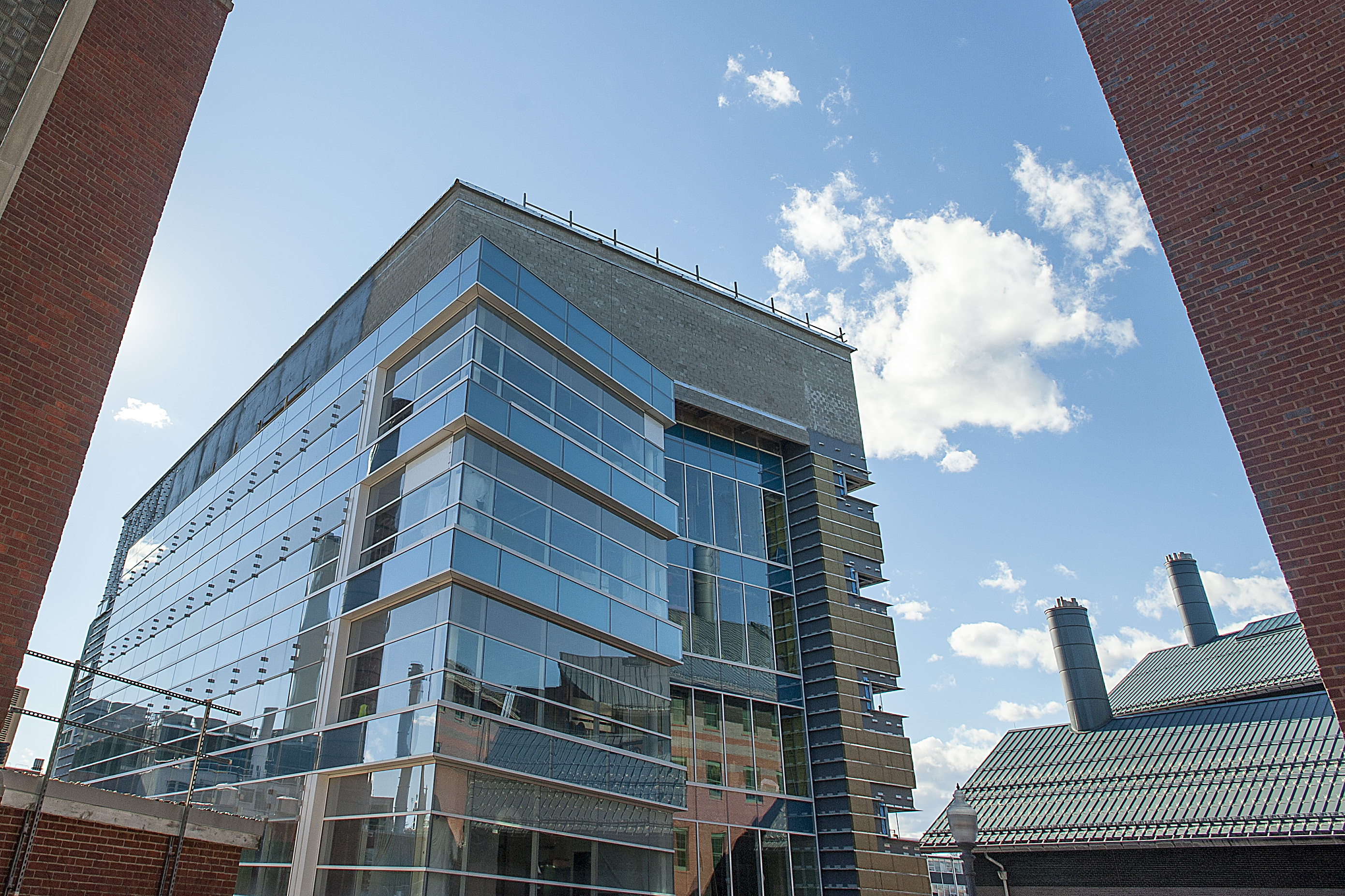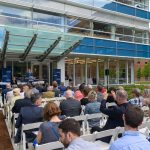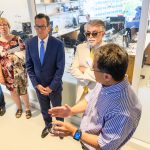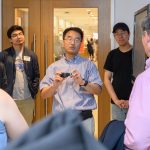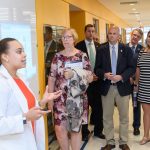Today, the University of Connecticut celebrated the opening of its new Engineering & Science Building, a state-of-the-art facility whose carefully planned design and modern labs will help the University and its researchers drive new innovations in a range of scientific disciplines.
Gov. Dannel P. Malloy, UConn President Susan Herbst, industry partners, students and researchers, and others gathered Monday to cut the ribbon to celebrate the opening of the five-story building, which sits strategically on campus adjacent to buildings housing UConn’s programs in chemistry, pharmacy, and other sciences.
The building was completed this spring and now houses programs in engineering and life sciences, including the Institute for Systems Genomics.
It represents yet another milestone in the Next Generation Connecticut initiative, which funded the $95 million project cost as part of the state’s larger plan to expand STEM (science, technology, engineering, and math) at UConn as a pathway to economic growth in the state.
“This building is the culmination of significant investment by the state of Connecticut in the field of STEM, and in the future of engineering,” said Kazem Kazerounian, dean of the UConn School of Engineering. “Nearly 40 percent of our state’s economy is generated by engineering-related industries, and with our 70 percent increase in engineering enrollment, and significant investment in resources, UConn is providing research, talent, and technology that will pay dividends for decades to come.”
The new five-story Engineering & Science building comprises 118,000 gross square feet of laboratories, research space, meeting and gathering spaces, offices, and other amenities meant to foster cross-campus and interdisciplinary collaborations between Storrs, UConn Health, and UConn’s other campuses.
The School of Engineering uses three floors, housing programs such as robotics, advanced manufacturing, cyber physics, virtual and augmented reality, mechatronics, and other topics. The Institute for Systems Genomics is on two floors, including its Center for Genome Innovation, microbial analysis and resource service, and other programs.
UConn and its researchers have ongoing partnerships with many companies as part of the innovation taking place in the new building. It also supports UConn’s work to fuel Connecticut’s economy with new technologies, highly skilled graduates, marketable patents and licenses, and the creation of high-wage jobs in new and emerging companies.
The building also incorporates an open-concept lab design, which will help foster collaboration between researchers with various specialties. That design also allows for equipment to be placed together rather than spread across different floors or buildings, letting researchers spend more time on their core work and reducing or eliminating the need to transport their work between locations.
The structure, designed by Mitchell Giurgola Architects LLP, was built to achieve LEED Silver Certification in sustainability and energy efficiency, and to comply with Connecticut High-Performance Building Standards. It was built by Fusco Corp., with construction starting in 2015 and wrapping up this spring.
The new structure also gives scientists access to a high-speed broadband network that delivers the capacity they need to process large amounts of data quickly – a necessity in many research fields today.
The new building addresses a pressing need for space within the School of Engineering, where enrollment has doubled over the past decade. The school recently hired more than 30 faculty to expand its research efforts and teaching staff. In addition, UConn’s School of Engineering supports numerous partnerships with world-class manufacturers, such as General Electric, Pratt & Whitney, Fraunhofer, Comcast, and FEI.
Here is a breakdown of associated labs and centers located in the building:
First Floor
Computational Design Lab: This lab’s research activities are in the area of Computational Design and Synthesis of Mechanical Systems. In particular, the Computational Design Lab focuses on developing new engineering models, representations, algorithms, and design semantics to enable systematic and efficient design, analysis and manufacturing of engineering artifacts.
Robotics and Controls Lab: This lab in the Electrical and Computer Engineering department works on various estimation and control problems for applications in robotics and other engineering domains. The main focus has been to develop estimation and control tools for non-linear systems in the application areas of: Human-robot collaboration, visual navigation and tracking, localization and mapping, walking gait estimation of robots/humans, camera-based 3-D estimation, visual servo control, and multi-agent system.
Manufacturing Systems Lab: Its mission is to advance the information technology and mathematical optimization techniques of strategic importance to society, including Intelligent Manufacturing Systems planning, scheduling, and coordination of design, manufacturing, and service activities; Smart and Green Buildings and Eco Communities-optimized energy management, HVAC fault detection and diagnosis, emergency crowd guidance, and eco communities; Smart Power Systems-smart grid, design of auction methods for electricity markets, robust renewable (wind and solar) integration to the grid, electricity load and price forecasting with demand management, and micro grid; and mathematical optimization of large-scale mixed-integer problems, and decision-making under uncertain, distributed, or antagonistic environments.
Second and Third Floors
Institute for Systems Genomics: This is UConn’s premier genomics research and training program. It includes faculty from multiple disciplines: molecular & cell biology, ecology and evolutionary biology, allied health sciences, and UConn Health. Offices for researchers from UConn Health’s Department of Genetics and Genome Sciences are included in this space, emphasizing the cross-campus collaborative nature of the research area.
Center for Genome Innovation: This is the core service and training center for UConn’s genomics and cytogenetics programs. Its new space features some of the latest instrumentation for next-generation genome sequencing, analysis, and genotyping. The Center for Genome Innovation supports more than 120 labs at UConn campuses in Storrs, Farmington, and Avery Point and provides services for clients outside of UConn.
Microbial Analysis, Resources, and Services: This core facility assists researchers by performing microbiome, targeted amplicon, and small genome sequencing.
Computational Biology Core: This core group provides crucial computational power and technical support to UConn researchers and affiliates. The Computational Biology Core is led by assistant professor Jill Wegrzyn, who recently helped decipher the largest genome sequenced and assembled to date – the sugar pine tree.
Genetic Counseling Master’s Degree Program: Affiliated with Allied Health Sciences, this new program will teach students how to interpret genetic testing results, a rapidly growing aspect of health care.
Professional Science Master’s in Health Care Genetics programs: Affiliated with Allied Health Sciences, this program offers a science degree “plus” experiential and professional development training designed to increase knowledge and prepare leaders in health care genetics who translate discoveries in genetic sciences to products, policies, and practices.
Fourth Floor
Biointegrated Materials and Devices at Nano- and Micro-scales: Research here focuses on the development of materials, devices, and systems at extremely small-scale for applications in biomedicine.
Neuroengineering and Pain Research: This lab focuses on sensory coding and processing in the peripheral nervous system with a goal of developing next-generation strategies and devices for better management of chronic pain.
Smart Imaging: This lab’s core mission is the development of novel imaging and sensing tools to tackle measurement problems in biology, medicine, and metrology, including lab-on-a-chip platforms.
Fifth Floor
Center for Clean Energy Engineering: C2E2 is a multi-disciplinary research center that provides leadership in education, research and innovation of clean and efficient energy systems. By catalyzing the transformation of science to systems for a global “Sustainable Energy Economy,” the center facilitates industrial and organizational development of cost-effective solutions to current and emerging global energy and environmental concerns.
The center’s mission is to become a leader in transforming science to systems; bridging the gap from fossil fuels to hydrogen economy; enabling industries and organizations in the development of cost-effective and timely solutions for critical technical issues; and providing guidance and leadership in solving global societal issues, ranging from sustainable energy to the environment.
Process Systems and Operations Research: This lab uses modeling, simulations, and control algorithms to develop novel solutions to emerging problems in a wide array of industry applications ranging from water treatment and desalination to renewable energy and personalized medicine.
Sustainable Water and Energy Learning Laboratory: This laboratory is focused on enabling emerging technology in desalination, water treatment, and reuse through innovative materials and process design. Its areas of expertise include forward osmosis, pressure-retarded osmosis, membrane formation, electrospinning, hollow-fiber spinning, and membrane characterization.
